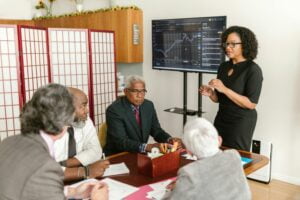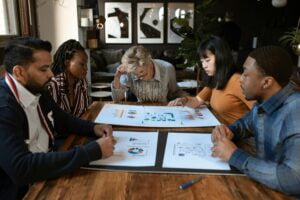Teamwork and Collaboration
In an era characterized by rapid technological advancements and complex challenges, the importance of teamwork and collaboration cannot be overstated. Whether in the workplace, educational settings, or community projects, the ability to work effectively with others is a critical component of personal and collective development. Embracing teamwork and collaboration fosters innovation, drives success, and enhances both individual and group growth.

Understanding Teamwork and Collaboration
Teamwork refers to the combined efforts of a group working towards a common goal, leveraging each member’s strengths to achieve objectives more efficiently. Collaboration, on the other hand, involves working together with others to produce or create something. While teamwork often implies a structured approach within a defined team, collaboration can occur more fluidly across different groups and organizations.
Key elements of effective teamwork and collaboration include:
- Clear Goals: A shared understanding of objectives and desired outcomes.
- Open Communication: Honest and transparent dialogue among team members.
- Defined Roles and Responsibilities: Clearly outlined duties to ensure everyone knows their part in the process.
- Mutual Respect: Valuing each team member’s contributions and perspectives.
- Trust and Accountability: Relying on each other to fulfill commitments and deliver results.

The Benefits of Teamwork and Collaboration
- Enhanced Problem-Solving and Innovation: Collaboration brings together diverse perspectives and expertise, leading to creative solutions and innovative approaches. Teams can tackle complex problems more effectively than individuals working alone.
- Increased Efficiency and Productivity: When team members work well together, tasks are completed more quickly and efficiently. Leveraging each person’s skills and delegating tasks appropriately reduces redundancy and accelerates progress.
- Skill Development: Working in teams provides opportunities for individuals to develop and refine skills such as communication, leadership, and conflict resolution. Exposure to different roles and responsibilities enhances personal growth and professional development.
- Stronger Relationships and Network Building: Teamwork fosters strong interpersonal relationships and networks. Building trust and camaraderie within a team can lead to lasting professional connections and collaborative opportunities.
- Greater Accountability and Motivation: A collaborative environment encourages individuals to take ownership of their work and remain motivated. Knowing that others depend on their contributions can drive team members to perform at their best.
- Improved Learning and Knowledge Sharing: Collaboration allows for the exchange of knowledge and expertise. Team members can learn from each other’s experiences and insights, leading to continuous improvement and skill enhancement.

Strategies for Effective Teamwork and Collaboration
- Foster Open Communication: Encourage regular and transparent communication. Create channels for feedback and ensure that everyone feels comfortable sharing their ideas and concerns.
- Define Roles Clearly: Clearly outline each team member’s responsibilities and expectations. This helps prevent confusion and ensures that everyone understands their role in achieving the team’s goals.
- Build a Collaborative Culture: Promote a culture of mutual respect and trust. Recognize and celebrate the contributions of all team members and encourage a spirit of cooperation and support.
- Set Shared Goals: Align team efforts with clear, common objectives. Ensure that everyone understands how their individual contributions fit into the larger picture.
- Encourage Diverse Perspectives: Embrace and value diverse viewpoints and skills. Diverse teams are better equipped to approach problems from different angles and generate innovative solutions.
- Provide Opportunities for Development: Offer training and resources to help team members develop their collaboration skills. Encourage participation in team-building activities and workshops.
- Resolve Conflicts Constructively: Address conflicts and disagreements promptly and constructively. Foster an environment where issues can be discussed openly and resolved in a manner that respects all parties involved.
